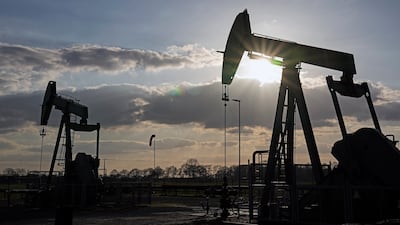Russia will not supply oil to countries that opt to impose a price cap on its crude, a senior official said on Friday.
The price cap has been proposed by western countries to make it difficult for Russia, the world's second-biggest exporter of crude, to fund its war in Ukraine.
"As far as I understand, we won't be supplying oil to those countries that would impose such a cap and our oil, oil products will be redirected to the countries which are ready to co-operate with us," Russian central bank governor Elvira Nabiullina told a media briefing on Friday.
The proposal by G7 nations would escalate global oil prices, she added.
With the conflict in Ukraine, which began in late February, continuing unabated, western nations are trying to increase the pressure on Russia while also balancing soaring inflation.
The oil price cap scheme, first proposed by the US treasury secretary Janet Yellen last month, could be set at half of the Russian purchasing price, reports said.
However, the final agreement and price cap are yet to be finalised.
Brent, the key benchmark for two thirds of the world's oil, surged to a notch under $140 in March after sanctions were imposed on Russia in retaliation for its military offensive in Ukraine.
While prices have since cooled, they are still up more than 30 per cent since the start of the year.
Russia, whose economy has been hit by western sanctions, also revised its gross domestic product forecast for this year.
"Economic decline will be less deep this year, namely 4 per cent - 6 per cent," Ms Nabiullina said.
“Over the next year, GDP will edge down by 1 per cent to 4 per cent … we expect GDP to be 1 to 2.5 per cent higher in the fourth quarter of the next year than in the fourth quarter of this year,” she added.
The central bank also announced on Friday that it will decrease its key interest rate by 150 basis points to 8 per cent per annum as inflation eases in the country.
“Our decision is based on a comprehensive assessment of current conditions and the updated macroeconomic forecast,” Ms Nabiullina said.
Russia lowered its inflation forecast for this year in the range of 12 per cent to 15 per cent and said the projection for next year remains at the level of 5 per cent to 7 per cent.
“Our monetary policy takes into account the need for a structural transformation of the economy and is aiming to return inflation to the 4 per cent target in 2024,” Ms Nabiullina said.
“Prices have been declining almost continuously for nine weeks by now. We still believe that the main reason for the deceleration of inflation is the adjustment of prices after their surge in March."
The current consumer price growth rates remain low amid subdued demand. The decline in business activity is slower than the Bank of Russia expected in June, the bank said.
“The rouble has strengthened significantly. Manufacturers and trade companies can see that some prices were over-increased. However, prices cannot adjust overnight — this process takes time. Businesses are trying to conceive what level of prices will be acceptable for consumers and cover their rising costs,” Ms Nabiullina said.
After plummeting as much as 100 per cent to the US dollar, Russia's rouble has recovered strongly and is currently trading at roughly 57.85 to the dollar.


